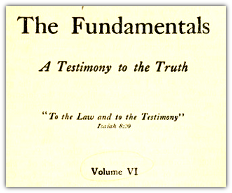Can’t Be Our Maker – Must Be Math
Body
“Governor Cuomo’s pronouncement is shocking. He didn’t merely avoid referring to God. The governor denied that God had anything to do with easing this crisis. Is this naïve? Or skeptical? Or foolish? Only God and the governor know for sure, but God knows how to humble the proud.” - P&D
Discussion
“The Parable of the Sower frees us from our desire for resolution.”
Body
“How can we communicate the urgency of the gospel without manipulating others’ emotions or fears? How can we present the gospel in a way that is inviting without truncating the message to make it more palatable?” - Christianity Today
Discussion
Understanding our History: How Imperfect Patriots Changed America for the Better
Body
“Historians have spilled much ink since America’s founding over one single question: Is the U.S. a Christian nation?” - Christianity Today
Discussion
A Forty-year Providence
When I first saw it, it was all jumbled up with grocery ads and direct mail fliers that urged me to consider the metaphysical significance of my current gutter system. But this piece of mail, this greeting-sized envelope postmarked from Long Island, NY, was less noisy, unassuming somehow. I recognized the handwriting as belonging to my husband’s grandmother—a carefully-formed script that she’d learned through hours of instruction in elementary school, back before the ubiquitous keyboards and touch screens that now dominate our lives.
Discussion
The Testimony of Foreign Missions to the Superintending Providence of God
CHAPTER I: THE TESTIMONY OF FOREIGN MISSIONS TO THE SUPERINTENDING PROVIDENCE OF GOD
BY THE LATE ARTHUR T. PIERSON
God is in creation; cosmos would still be chaos with God left out. He is also in events; the whole of mission history is a mystery until read as His story.
We are now to look at the proofs of a Superintending Providence of God in foreign missions. The word “providence” literally means forevision, and hence, foreaction—preparation for what is foreseen—expressing a divine, invisible rule of this world, including care, control, guidance, as exercised over both the animate and inanimate creation. In its largest scope it involves foreknowledge and foreordination, preservation and administration, exercised in all places and at all times.
For our present purpose the word “providence” may be limited to the divine activity in the entire control of persons and events. This sphere of action and administration, or superintendence, embraces three departments: first, the natural or material—creation; second, the spiritual or immaterial—new creation; and third, the intermediate history in which He adapts and adjusts the one to the other, so that even the marred and hostile elements, introduced by sin, are made tributary to the final triumph of redemption. Man’s degeneration is corrected in regeneration; the natural made subservient to
6 The Fundamentals
the supernatural, and even the wrath of man to the love and grace of God.
Discussion
The Jail Stalker

My pastoral colleague, Paul, and I have ministered for a number of years to inmates at the Shakopee Jail. The weekly Bible studies we lead there did not originate from a strategic vision developed in the sterile confines of a board room. They sprang from the messy reality that a new attendee of our church had taken up residence at the jail for a season. Although we did not know him well, he had sent word that he would appreciate a visit. The look on his haggard face and the tears of appreciation that welled up in his tough-guy eyes were all it took for me to keep going back long after he was released and living in another state.
Jesus’ prophecy concerning God’s final commendation of those who ministered in life to vulnerable people took on new meaning: “I was in prison and you visited to me” (Matt. 25:36). In Jesus’ vignette those receiving this divine accreditation are incredulous: “When did we see you sick or in prison?” they ask God (Matt. 25:39). “And the King will answer them, ‘Truly I say to you, as you did it to one of the least of these my brothers, you did it to me’ ” (Matt. 25:40). God takes special interest in prisoners.
Yet our ministry to these marginalized members of society is far from a one-way extension of mercy. As is standard in Christ’s kingdom, those who give much receive more. Any aid we render to inmates is paid back many times over in lessons learned and skin-tingling evidences that God stalks the darkest recesses of our world.


 (
(

Discussion